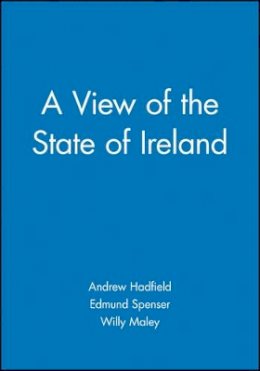
Stock image for illustration purposes only - book cover, edition or condition may vary.
A View of the State of Ireland
Edmund Spenser
€ 59.80
FREE Delivery in Ireland
Description for A View of the State of Ireland
Paperback. aeo Provides the first ever student edition of this highly influential and, outside the library, otherwise unavailable text. aeo Represents a key critical intervention in the public sphere by a major canonical Renaissance poet. aeo Makes available a controversial and founding document in English colonial discourse. Editor(s): Hadfield, Andrew; Maley, Willy. Num Pages: 232 pages, 0. BIC Classification: DNF; HBJD1. Category: (P) Professional & Vocational; (UP) Postgraduate, Research & Scholarly; (UU) Undergraduate. Dimension: 216 x 147 x 15. Weight in Grams: 306.
This student edition is based on the first published text and offers an authoritative introduction, discussing the View's reception, relating it to Spenser's corpus as a whole, and summarising recent scholarship.
This student edition is based on the first published text and offers an authoritative introduction, discussing the View's reception, relating it to Spenser's corpus as a whole, and summarising recent scholarship.
Product Details
Format
Paperback
Publication date
1997
Publisher
John Wiley and Sons Ltd United Kingdom
Number of pages
232
Condition
New
Number of Pages
228
Place of Publication
Hoboken, United Kingdom
ISBN
9780631205357
SKU
V9780631205357
Shipping Time
Usually ships in 7 to 11 working days
Ref
99-50
About Edmund Spenser
Andrew Hadfield is Senior Lecturer in English Literature at the University of Wales, Aberystwyth, and the author of Literature, Politics and National Identity: Reformation to Renaissance (1994). He and Willy Maley co-edited Representing Ireland: Literature and the Origins of Conflict, 1534-1660 (1993), with Brendan Bradshaw. Willy Maley is Lecturer in English Literature at the University of Glasgow. Apart from his collaborative volume with Maley and Bradshaw, he is also the author of Salvaging Spenser: Colonialism, Culture and Identity (1997) and A Spenser Chronology (1994).
Reviews for A View of the State of Ireland
"It will certainly be good to have an easily available and affordable version of the Vewe, and this volume has several virtues which will recommend it to students and teachers of Spenser and related topics. It will certainly further Spenser studies, especially among undergraduates, to have this user-friendly edition available, and the editors and publisher are to be congratulated on its appearance." Spenser Newsletter 28, 2 (1997) "This timely edition of Spenser's infamous prose treatise about Ireland... which .includes a judicious introductory essay outlining the current state of critical debate about Spenser, a chronology of his life, a glossary, and an annotated bibliography, goes a long way towards redressing ill-informed suppositions about this sixteenth-century dialogue. The edition has the further virtue that it does not overwhelm the text with commentary or annotation. This deft, informative and user-friendly edition of A View of the State of Ireland persuasively urges us not just to read Spenser's text in the first instance but to give full consideration to the historical and political contexts and epistemological frameworks within which readings of this highly problematical but central colonial treatise are constructed." Irish University Review, Spring/Summer "The appearance of a new paperback edition of Ware's version of the Vewe, carefully prepared for a non-specialist audience by Andrew Hadfield and Willy Maley, is bound to raise the temperature of this debate. Mindful that other scholars might complain that Ware's text is corrupt, Hadfield and Maley have overcome this problem by including an appendix of those passages that were omitted from Spenser's text by Ware. This is arguably the most important part of their attractive and accessible little book, and it should guarantee that their edition will become a standard reference for academics as well as general readers. Ireland "The introduction as a whole is a model of clarity, balance and compression which will admirably fulfil the editors aim of bringing Spenser's View to a far wider readership and they have provided also a critical guide to further reading which, both in its comprehensiveness and its detachment from the scholastic wranglings that have so often disfigured Spenser commentary, is exemplary." Irish Studies Review
